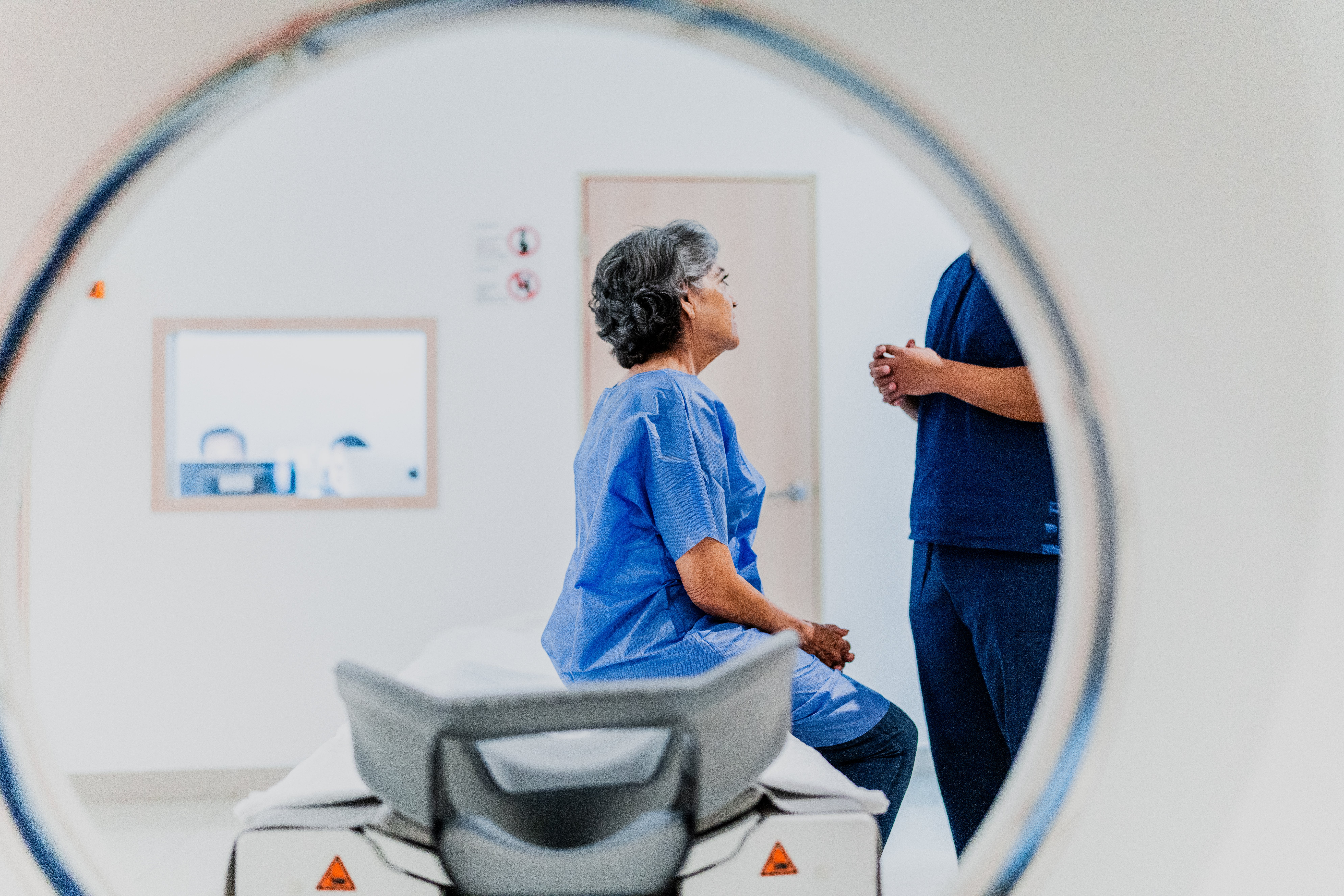recently asked myself if I’ll still have a healthy brain as I get older. I hold a professorship at a neurology department. Nevertheless, it is difficult for me to judge if a particular brain, including my own, suffers from early neurodegeneration.
My new study, however, shows that part of your brain increases in size with age rather than degenerating.
The reason it’s so hard to measure neurodegeneration is because of how complicated it is to measure small structures in our brain.
Modern neuroimaging technology allows us to detect a brain tumour or to identify an epileptic lesion. These abnormalities are several millimetres in size and can be depicted by a magnetic resonance imaging (MRI) scanner, which operates at around 30,000-60,000 times stronger than the natural magnetic field of the Earth. The problem is that human thinking and perception operate at an even smaller scale.
Our thinking and perception happens in the neocortex. This outer part of our brain consists of six layers. When you feel touch to your body, layer four of your sensory cortex gets activated. This layer is the width of a grain of sand – much smaller than what MRI scanners at hospitals can usually depict. When you modulate your body sensation, for example by trying to read this text rather than feeling the pain from your bad back, layers five and six of your sensory cortex get activated – which are even smaller than layer four.

For my study, published in the journal Nature Neuroscience, I had access to a 7 Tesla MRI scanner, which offers five times better image resolution than standard MRI scanners. It makes snapshots of the fine-scale brain networks during perception and thought visible.
Using a 7 Tesla scanner, my team and I investigated the sensory cortex in healthy younger adults (around 25 years old) and healthy older adults (around 65 years old) to better understand brain ageing. We found that only layers five and six, which modulate body perception, showed signs of age-related degeneration.
Layer four, needed to feel touch to your body, was enlarged in healthy older adults in my study. We also did a comparative study with mice. We found similar results in the older mice, in that they also had a more pronounced layer four than the younger mice.
However, evidence from our study of mice, which included a third group of very old mice, showed this part of the brain may degenerate in more advanced old age.
Current theories assume our brain gets smaller as we grow older. But my team’s findings contradict these theories in part. It is the first evidence that some parts of the brain get bigger with age in normal older adults.
Older adults with a thicker layer four would be expected to be more sensitive to touch and pain, and (due to the reduced deep layers) have difficulties modulating such sensations.
To understand this effect better, we studied a middle-aged patient who was born without one arm. This patient had a smaller layer four. This suggests their brain received fewer impulses in comparison to a person with two arms and therefore developed less mass in layer four. Parts of the brain that are used more develop more synapses, hence more mass.
Rather than systematically degenerating, older adults’ brains seem to preserve what they use, at least in part. Brain ageing may be compared with a complex machinery in which some often-used parts are well-oiled, while others, less frequently used, get roasted. From that perspective, brain ageing is individual, shaped by our lifestyle, including our sensory experiences, reading habits, and cognitive challenges that we take on in everyday life.
In addition, it shows that the brains of healthy older adults preserve their capacity to stay in tune with their surroundings.
A lifetime of experiences
There is another interesting aspect about the results. The pattern of brain changes that we found in older adults – a stronger sensory processing region and a reduced modulatory region – shows similarities to neurodivergent disorders such as the autism spectrum disorder or attention deficit hyperactivity disorder.
Neurodivergent disorders are characterised by enhanced sensory sensitivity and reduced filtering abilities, leading to problems in concentration and cognitive flexibility.
Do our findings indicate that ageing drives the brain in the direction of neurodivergent disorders? Older adults brains have been formed by a lifetime of experiences, whereas neurodivergent people are born with these brain patterns. So it would be hard to know what other effects building brain mass with age might have.
Yet, our findings give us some clues about why older adults sometimes have difficulties adapting to new sensory environments. In such situations, for example, being confronted with a new technical device or visiting a new city, the reduced modulatory abilities of layers five and six may become particularly evident, and may increase the likelihood for disorientation or confusion. It may also explain reduced abilities for multitasking with age, such as using a mobile phone while walking. Sensory information needs to be modulated to avoid interference when you’re doing more than one thing.
Both the middle and the deep layers had more myelin, a fatty protective layer that is crucial for nerve function and communication, in the older mice as well as humans. This suggests that in people over the age of 65, there is a compensatory mechanism for the loss of modulatory function. This effect seemed to be breaking down in the very old mice, though.
Our results provide evidence for the power of a person’s lifestyle for shaping the ageing brain.
Image Credit:
News
Deadly Pancreatic Cancer Found To “Wire Itself” Into the Body’s Nerves
A newly discovered link between pancreatic cancer and neural signaling reveals a promising drug target that slows tumor growth by blocking glutamate uptake. Pancreatic cancer is among the most deadly cancers, and scientists are [...]
This Simple Brain Exercise May Protect Against Dementia for 20 Years
A long-running study following thousands of older adults suggests that a relatively brief period of targeted brain training may have effects that last decades. Starting in the late 1990s, close to 3,000 older adults [...]
Scientists Crack a 50-Year Tissue Mystery With Major Cancer Implications
Researchers have resolved a 50-year-old scientific mystery by identifying the molecular mechanism that allows tissues to regenerate after severe damage. The discovery could help guide future treatments aimed at reducing the risk of cancer [...]
This New Blood Test Can Detect Cancer Before Tumors Appear
A new CRISPR-powered light sensor can detect the faintest whispers of cancer in a single drop of blood. Scientists have created an advanced light-based sensor capable of identifying extremely small amounts of cancer biomarkers [...]
Blindness Breakthrough? This Snail Regrows Eyes in 30 Days
A snail that regrows its eyes may hold the genetic clues to restoring human sight. Human eyes are intricate organs that cannot regrow once damaged. Surprisingly, they share key structural features with the eyes [...]
This Is Why the Same Virus Hits People So Differently
Scientists have mapped how genetics and life experiences leave lasting epigenetic marks on immune cells. The discovery helps explain why people respond so differently to the same infections and could lead to more personalized [...]
Rejuvenating neurons restores learning and memory in mice
EPFL scientists report that briefly switching on three “reprogramming” genes in a small set of memory-trace neurons restored memory in aged mice and in mouse models of Alzheimer’s disease to level of healthy young [...]
New book from Nanoappsmedical Inc. – Global Health Care Equivalency
A new book by Frank Boehm, NanoappsMedical Inc. Founder. This groundbreaking volume explores the vision of a Global Health Care Equivalency (GHCE) system powered by artificial intelligence and quantum computing technologies, operating on secure [...]
New Molecule Blocks Deadliest Brain Cancer at Its Genetic Root
Researchers have identified a molecule that disrupts a critical gene in glioblastoma. Scientists at the UVA Comprehensive Cancer Center say they have found a small molecule that can shut down a gene tied to glioblastoma, a [...]
Scientists Finally Solve a 30-Year-Old Cancer Mystery Hidden in Rye Pollen
Nearly 30 years after rye pollen molecules were shown to slow tumor growth in animals, scientists have finally determined their exact three-dimensional structures. Nearly 30 years ago, researchers noticed something surprising in rye pollen: [...]
NanoMedical Brain/Cloud Interface – Explorations and Implications. A new book from Frank Boehm
New book from Frank Boehm, NanoappsMedical Inc Founder: This book explores the future hypothetical possibility that the cerebral cortex of the human brain might be seamlessly, safely, and securely connected with the Cloud via [...]
How lipid nanoparticles carrying vaccines release their cargo
A study from FAU has shown that lipid nanoparticles restructure their membrane significantly after being absorbed into a cell and ending up in an acidic environment. Vaccines and other medicines are often packed in [...]
New book from NanoappsMedical Inc – Molecular Manufacturing: The Future of Nanomedicine
This book explores the revolutionary potential of atomically precise manufacturing technologies to transform global healthcare, as well as practically every other sector across society. This forward-thinking volume examines how envisaged Factory@Home systems might enable the cost-effective [...]
A Virus Designed in the Lab Could Help Defeat Antibiotic Resistance
Scientists can now design bacteria-killing viruses from DNA, opening a faster path to fighting superbugs. Bacteriophages have been used as treatments for bacterial infections for more than a century. Interest in these viruses is rising [...]
Sleep Deprivation Triggers a Strange Brain Cleanup
When you don’t sleep enough, your brain may clean itself at the exact moment you need it to think. Most people recognize the sensation. After a night of inadequate sleep, staying focused becomes harder [...]
Lab-grown corticospinal neurons offer new models for ALS and spinal injuries
Researchers have developed a way to grow a highly specialized subset of brain nerve cells that are involved in motor neuron disease and damaged in spinal injuries. Their study, published today in eLife as the final [...]





















